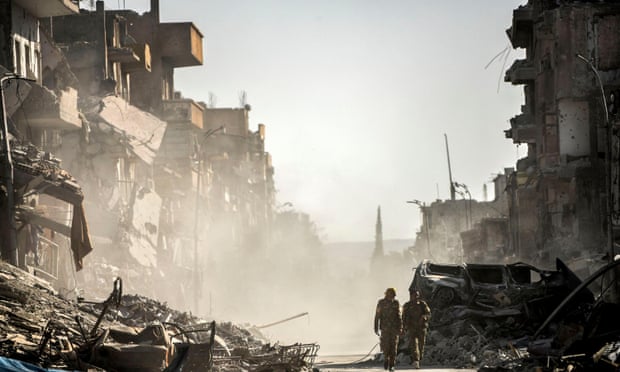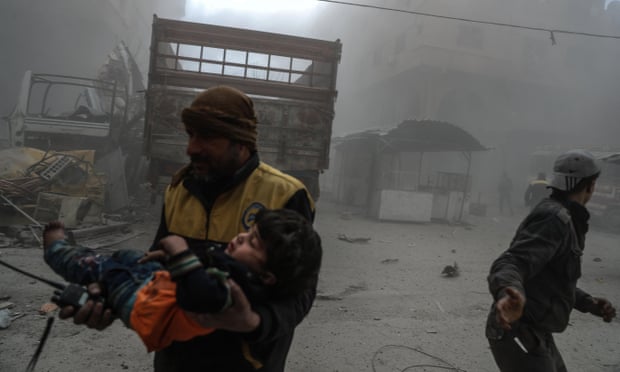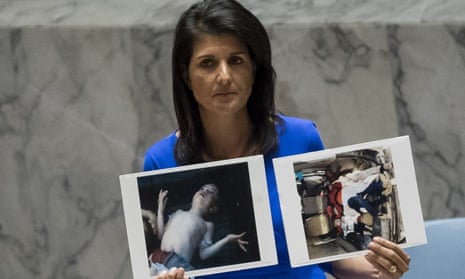North Korea sent Syria more than 40 items used in ballistic missile and chemical weapons programmes in the five years from 2012-17, a leaked UN report has said.
The panel of experts monitoring sanctions against North Korea said its investigations into Pyongyang’s transfer of prohibited ballistic missile, conventional arms and dual use goods found the previously unreported shipments.
It said an unnamed UN member state also reported evidence that Myanmar received a range of conventional weapons from North Korea including multiple rocket launchers and surface-to-air missiles in addition to ballistic missile systems.
The US and other western nations have accused Syria of using chemical weapons in rebel-controlled areas, including recently in the Damascus suburb of eastern Ghouta, which Bashar Assad’s government denies.
The more than 200-page report to the UN security council, which diplomats expect to be made public in mid-March, details “substantial new evidence” about North Korea’s dealings with Syria, dating back to 2008.
According to an unidentified member state, North Korea’s Ryonhap-2 corporation was involved that year in a Syrian ballistic missile programme, the report said.
More recently, it said, a visit by a technical delegation from North Korea in August 2016 “involved the transfer to Syria of special resistance valves and thermometers known for use in chemical weapons programmes”.
That information came from another member state, which also reported that North Korean technicians “continue to operate at chemical weapons and missile facilities at Barzeh, Adra and Hama”, the report said.
It quoted Syria’s reply to the panel about the reports: “There are no [North Korean] technical companies in Syria and the only presence of some [North Korean] individuals are confined in the field of sports under private individual contracts for training athletics and gymnastics.”
Q&AWhich outside powers are involved in the Syrian war?
Show

Over seven years, the civil war has dragged in multiple foreign nations, turning what started as a pro-democracy uprising into a quagmire of overlapping conflicts.
Global powerhouses including Iran, Israel, Russia, Turkey, and the United States have all, to different extents, engaged their militaries in the conflict. At the same time, they have supported warring factions on the ground, including Iran-allied Hezbollah, Kurdish militia, and the US-backed Syrian Democratic Forces alliance. Islamic State and al-Qaida are also present.
The UN experts added that they had not yet received a reply with documents supporting this claim and a list of all North Koreans who had travelled to Syria.
The panel said it also examined shipments interdicted by member states that were sent by the Chinese company Cheng Tong Trading Co to Damascus-based companies in 2016 and 2017.
The experts said 13 shipping containers were filled with “acid-resistant tiles” that would cover 5,000 sq metres, enough for a large-scale industrial project. One country’s analysis concluded that the tiles “were to be used for activities conducted at high temperatures”, the panel said, while another country said the material “can be used to build bricks for the interior walls of [a] chemical factory”.
Q&AWhy is the regime targeting eastern Ghouta?
Show

Eastern Ghouta is the last rebel-held enclave bordering the Syrian capital, Damascus. Since 2013, forces loyal to President Bashar al-Assad have imposed a suffocating and deadly siege on the area. Yet several insurgent factions have retained control.
This month, Syria’s army launched one of the most intense bombardments of the war, saying their assault was necessary to end rebel mortar strikes on the capital. Residents accuse Russia of also bombing Ghouta, a mixture of dense suburbs and fields that once served as the breadbasket for Damascus.
The panel also said it continued its investigations into the activities of Ryu Jin, a senior official in Syria for the Korea Mining Development Trading Corporation known as KOMID, who is on the UN sanctions blacklist. He listed his rank as a major general in a letter with an official proposal to Syrian major general Ali Salim of the Army Supply Bureau for “an air defence command and control system”, it said.
KOMID is North Korea’s primary arms dealer and main exporter of goods and equipment related to ballistic missiles and conventional weapons.
The report said, among other activities, Ryu Jin shipped ball bearings and fibre-optic cables to Syria and earned €56,000 and €48,000 respectively, which was transferred through Tanchon Commercial bank.










